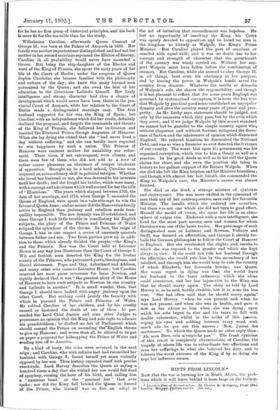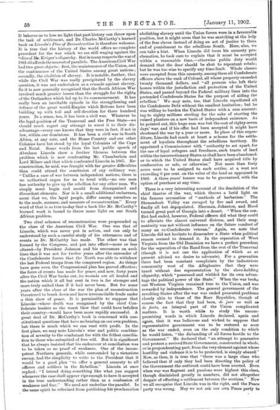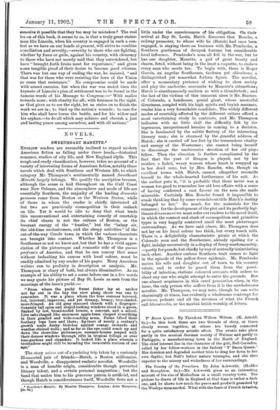HINTS FROM LINCOLN.* Npw that the war is burning low
in South Africa, the prob! lema which_ it will leave behind it loom large on the horizon.
• Lincoln's Phial 1p/construction. By Charles H. McCarthy. Ph.D. (Ys.) London : Megiatie, <11n1Lps. and Co. [Us. net. j
It behoves us to lose no light that past history can throw upon the task of settlement., and Dr. Charles McCarthy's learned book on Lincoln's Plan of Reconstruction is therefore welcome. It is true that the history of the world offers no complete precedent for the war which we are still waging against the relics of Mr. Kriiger's oligarchy. But in many respects the war of 1861-65 affords the nearest of parallels. The American Civil War had two great objects : first, the maintenance of the Union, and the continuance of the United States among great nations ; secondly, the abolition of slavery. It is notable, further, that while the Civil War was really precipitated by the slavery question, it was not undertaken as a crusade against slavery. So it is now generally recognised that the South African War involved much greater issues than the struggle for the rights of the Outlanders which led up to its commencement. It has really been an inevitable episode in the strengthening and defence of the great world-Empire which Britons have been bUilding up with toil and self-devotion for three hundred years. In a sense, too, it has been a civil war. Whatever be the legal position of the Transvaal and the Free State—we should much regret any attempt to wrest it to their dis- advantage—every one knows that they were in fact, if not in law, within our dominions. It has been a civil war in South Africa, at any rate, and the Home Country and our other Colonies have but stood by the loyal Colonists of the Cape and Natal. Some words from the last 'public speech of Abraham Lincoln show a further likeness between the problem which is now confronting Mr. Chamberlain and Lord Milner and that which confronted Lincoln in 1865. Re- construction, he said, was fraught with far greater difficulties than could attend the conclusion of any ordinary war. " Unlike a case of war between independent nations, there is no authorised organ for us to treat with,—no one man has authority to give up the rebellion for any other man. We simply must begin and mould from disorganised and discordant elements. Nor is it a small additional embarrass. ment that we, the loyal people, differ among ourselves as to the mode, manner, and measure of reconstruction." Every Word of that is so true to-day that a book like Mr. McCarthy's learned work is bound to throw some light on our South African problem.
. Two rival schemes of reconstruction were propounded at the close of the American Civil War. One was that of Lincoln, which was never put in action, and can only be• understood by such a careful study of his utterances and of events as Dr. McCarthy has made. The other was that formed by the Congress, and put into effect—more or less altered—by President Johnson and his successors on such lines that it was not for twelve years after the surrender of the Confederate forces that the North was able to withdraw the last Federal troops from the conquered region. As things have gone even the Congressional plan has proved effective; the force of events has made for peace, and now, forty years after the Civil War broke out, its wounds are all healed and the nation which it all but rent in two is far stronger and more truly united than if it had never been. But for some years after the close of the war the plan of reconstruction threatened to break down and leave irreconcilable feuds under a thin show of peace. It is permissible to suppose that Lincoln—whose death was recognised by the chief Con- federate leaders as the worst blow that could have befallen their country—would have been more rapidly successful. A great deal of Dr. McCarthy's book is concerned with con- stitutional questions that have no bearing on our own problem, but there is much which we can read with profit. In the first place, we may note Lincoln's wise and politic combina- tion of severity to the combatant foe with the fullest concilia- tion to those who submitted of free will. But it is significant that he always insisted that his endeavour at conciliation was to be taken as no proof of weakness. One of the incom- petent Northern generals, while surrounded by a victorious enemy, had the simplicity to write to the President that it would be a good plan " to offer a general amnesty to all officers and soldiers in the Rebellion." Lincoln at once replied : " I intend doing something like what you suggest whenever the case shall appear ripe enough to have it accepted in the true understanding rather than as a confession of weakness and fear." We need not underline the-parallel. In the same spirit he refrained from publishinehhartoclamation abolishing slavery until the Union forces were in a favourable position, lest it might seem that be was snatching at the help of the free slaves instead of doing an act of justice to them and of punishment to the rebellious South. Here, also, we can take a hint. When Lincoln did issue his amnesty .pro- clamation, be took care to explain that it must be accbpted within a reasonable time,—otherwise public duty would demand that the door should be shut to repentant rebels; but he was too wise to specify any time-limit. Whole classes were excepted from this amnesty, among them all Confederate officers above the rank of Colonel, all whose property exceeded twenty thousand dollars, and "all persons who left their homes within the jurisdiction and protsction of the United States, and passed beyond the Federal military lines into the pretended Confederate States for the • purpose of aiding the rebellion." We may note, too, that Lincoln repudiated all the Confederate Debt without the smallest hesitation; but he was willing to burden the ITnited States with a sum amount- ing to eighty millions sterling for the sake of starting the ruined planters on a new basis of independent existence. As he pointed out, this huge sum was but the cost of eighty-seven days' war, and if his offer had been accepted it might have shortened the war by a year or more. In place of this expen- diture, Lincoln had much at heart a scheme for the settle- ment of loyalists throughout the rebellious territory. He appointed a Commissioner with " authority to set apart, for the use of loyal refugees and freedmen, such tracts of land within the insurrectionary States as shall have been abandoned, or to which the United States shall have acquired title by confiscation or sale, or otherwise." Not more than forty acres were to be assigned to each settler, at a rent not exceeding 6 per cent. on the value of the land as appraised in 1860. A three years' tenure was to be guaranteed, with the option of purchase at any time.
There is a very interesting account of the desolation of the chief theatre of the war, which throws a lurid light on the famous accusation of " methods of barbarism." The Shenandoah Valley was ravaged by fire and sword, and finally all but depopulated. Sherman, Johnston, and Hood turned great part of Georgia into a desert. "When the con- flict had ended, however, Federal officers did what they could to alleviate the almost universal distress, and their mag- nanimity was not without influence on the future conduct of many an ex-Confederate veteran." Again, we note that Lincoln did not hesitate to dismember a State when political reason seemed to demand it. In the separation of West Virginia from the Old Dominion we have a perfect precedent for the separation of the Rand from the rest of the Transvaal (though it is not one the application of which as at present advised we desire to advocate). For a generation there had been constant complaints by the industrious community west of the Alleghenies that they were taxed without due representation by the slave-holding oligarchy, which "possessed and wielded for its own advan- tage the political power of the State." When the war broke out Western Virginia remained true to the Union, and was rewarded by independence. The general government of the revolting States after the war was ended presented problems closely akin to those of the Boer Republics, though of course the fact that they had been, de jure as well as de facto, an integral part of the Union complicated matters. It is worth while to study the uncom- promising words in which Lincoln declared, again and again, that it was ludicrous and wicked to suppose that representative government was to be restored as soon as the war ended, even on the only condition to which he would listen, "the disbanding of all forces hostile to the Government." He declared that " an attempt to guarantee and protect a revived State Government, constructed in whole, or in preponderating part, from the very element against whose hostility and violence it is to be protected, is simply absurd." Now, as then, it is true that "there was a large class who believed that if only they had been directing the policy of the Government the outbreak could have been averted. Even when war was flagrant and passions were highest this class, though diminished greatly in numbers, did not altogether despair of effecting a settlement between the sections." Now we all recognise that Lincoln was in the right, and the Peace party was wrong. May we not ask our own Peace party to conceive it possible that they too may be mistaken ? The real les;on of this book, it seems to us, is that a truly great states- man like Lincoln, when his country is engaged in such a con.- test as we have on our hands at present, will strive to combine conciliation and severity,—severity to those who are fighting, whether by force or guile, against his country, with clemency to those who have not merely said that they surrendered, but have " brought forth fruits meet for repentance," and given some tangible proof of their desire to become good citizens. There was but one way of ending the war, he insisted, "and that was for those who were resisting the laws of the Union to cease that resistance." No compromise could be made with armed enemies, but when the war was ended then the keynote of Lincoln's plan of settlement was to be found in the famous words of his Message to Congress :—" With malice towards none ; with charity for all; with firmness in the right, as God gives us to see the right, let us strive on to finish the work we are in ; to bind up the nation's wounds ; to care for him who shall have borne the battle, and for his widow and his orphan,—to do all which may achieve and cherish a just and lasting peace among ourselves, and with all nations,"








































 Previous page
Previous page